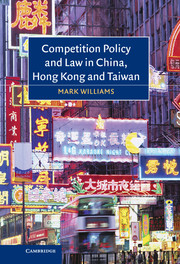Book contents
- Frontmatter
- Contents
- Preface
- Acknowledgements
- List of abbreviations
- 1 Introduction and methodology
- 2 Competition theory and the experience of states adopting competition law
- 3 The international perspective
- 4 China and economic regulation – history, politics and economics
- 5 Existing and proposed Chinese competition provisions
- 6 Competitive Hong Kong? myths, perception and reality
- 7 Implementation of competition policy in Hong Kong 1997–2004: economising with the truth
- 8 Electricity, telecommunication and broadcasting: competition regulation Hong Kong style
- 9 Taiwan - the third China
- 10 Political economy: an explanation of competition policy in Greater China
- 11 Competition policy and law in Greater China: where next?
- Bibliography
- Index
11 - Competition policy and law in Greater China: where next?
Published online by Cambridge University Press: 28 July 2009
- Frontmatter
- Contents
- Preface
- Acknowledgements
- List of abbreviations
- 1 Introduction and methodology
- 2 Competition theory and the experience of states adopting competition law
- 3 The international perspective
- 4 China and economic regulation – history, politics and economics
- 5 Existing and proposed Chinese competition provisions
- 6 Competitive Hong Kong? myths, perception and reality
- 7 Implementation of competition policy in Hong Kong 1997–2004: economising with the truth
- 8 Electricity, telecommunication and broadcasting: competition regulation Hong Kong style
- 9 Taiwan - the third China
- 10 Political economy: an explanation of competition policy in Greater China
- 11 Competition policy and law in Greater China: where next?
- Bibliography
- Index
Summary
Introduction
This book has sought to examine and explain the prevailing competition regimes in Greater China. A theoretical explanation of the existing states of affairs in China, Hong Kong and Taiwan that is robust has been offered in the last chapter. The final matter to be addressed is what is likely to happen, in the near-term future, in competition matters in each of the three jurisdictions. Clearly, this author does not pretend to be able to foretell the future of competition regulation in Greater China but it is possible to extrapolate from the present position, based on the most recent intelligence, in each jurisdiction to offer a reasonable prognosis of the most likely developments.
However, on the assumption that the author's hypothesis is a valid explanation of the existing situation in Greater China, it would seem apparent that without the adoption of a functioning democracy, effective competition regulation is impossible. Whilst that is indeed the author's contention, some measures may be able to be taken to attempt to ameliorate the situation, though in the final analysis fundamental political change is the only viable route to achieve an effective competition policy in both China and Hong Kong. The exception to this radical prescription is clearly Taiwan, where less drastic measures are necessary to ensure that an existing working system of competition regulation continues to develop and improve through experience, reflection and adaptation.
China
In China, the obstacles to achieving a better competitive regime based on law are formidable.
- Type
- Chapter
- Information
- Competition Policy and Law in China, Hong Kong and Taiwan , pp. 436 - 444Publisher: Cambridge University PressPrint publication year: 2005
- 2
- Cited by



